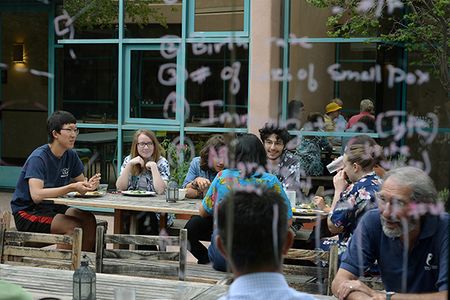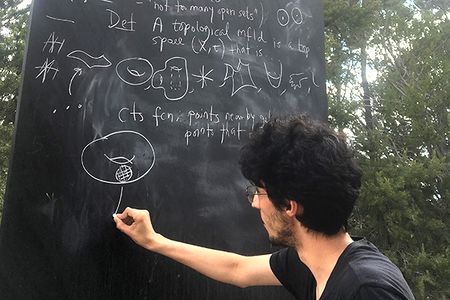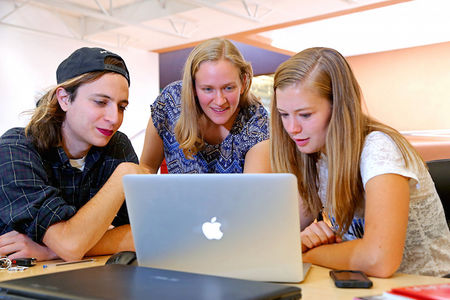Undergraduate Complexity Research (UCR): Difference between revisions
From Santa Fe Institute Events Wiki
(Created page with "{{Undergraduates Complexity Research (UCR) 2020}} 350px <br> 2020 UNDERGRADUATE COMPLEXITY RESEARCH <br> June 7 - August 15, 2020 <br...") |
No edit summary |
||
| (3 intermediate revisions by the same user not shown) | |||
| Line 7: | Line 7: | ||
June 7 - August 15, 2020 <br> | June 7 - August 15, 2020 <br> | ||
<br> | <br> | ||
[[Image:Ariel-WhiteSands.1.jpg|450px|{border}]] | |||
'''Program Overview''' <br> | '''Program Overview''' <br> | ||
The | The Santa Fe Institute (SFI) Undergraduate Complexity Research (UCR) program focuses on computational and mathematical modeling of complex systems, often paired with the analysis and collection of diverse domain-specific data. The program aims to empower the next generation of mathematically and computationally sophisticated researchers. | ||
SFI research involves a mixture of computational simulations, mathematical modeling, and the analysis of data. Applications are in fields as diverse as ecology and economics but with the unifying theme of complexity science. Drawing on SFI’s research strengths, the UCR program offers a guided introduction to the analytic and computational tools to interrogate complex systems, and experience in applying those tools to a novel research question under the guidance of SFI mentor(s). | |||
In particular, UCR participants will gain experience: | |||
• Designing a mathematical model of a physical, biological, or social system | |||
• Identifying opportunities to solve this model exactly or approximately | |||
• Coding and running simulations of the model | |||
• Recognizing assumptions behind a given mathematical technique | |||
• Assessing applicability of a given modeling approach to the system of interest | |||
• Designing computational experiments with an understanding of uncertainty and noise | |||
• Comparing results to theoretical predictions and real-world datasets | |||
• Exploring a model’s parameter space | |||
• Formulating new hypotheses based on the results of the simulations | |||
• Synthesizing results of models or simulations to support or refute hypotheses | |||
[[Image:2018 reu lunch 158.jpg|450px|{border}]] | [[Image:2018 reu lunch 158.jpg|450px|{border}]] | ||
UCR participants are in residence in Santa Fe for approximately 10 weeks, from June to August, 2020. The majority of this time will be spent working on a independent research project under the guidance of SFI mentors. Prior to arriving at SFI, participants are asked to complete SFI's online course “Introduction to Complexity.” Throughout the summer, participants will attend skills tutorials, topical lectures, research seminars, group discussions and professional development workshops.
| |||
''The REU program at SFI is one of the weirdest places that you can spend your summer, and it is the type of opportunity that can be offered no where else on this Earth. You will be stretched intellectually and welcomed into the SFI family with open arms. Your fellow REUs will help show you new ways of thinking and together you will create a summer that will be some of the best months of you life.'' -- 2018 REU | |||
<br> | <br> | ||
[[Image:2018 reu student monolith.jpg|450px|{border}]] | [[Image:2018 reu student monolith.jpg|450px|{border}]] | ||
'''Support:''' | '''Support & Transportation:''' | ||
Housing and a meal plan will be provided, at no cost to the student, in double-occupancy rooms with shared bathrooms at a nearby college in Santa Fe. Modest living stipends will also be provided to | Housing and a meal plan will be provided, at no cost to the student, in double-occupancy rooms with shared bathrooms at a nearby college in Santa Fe. Modest living stipends will also be provided to participants during their stay, along with some support of round-trip travel expenses from the home institution. Because Santa Fe lacks a full public transportation system, we encourage those participants who can bring their private transportation to do so.<br> | ||
<br> | <br> | ||
[[Image:reuphoto3.jpg|450px|{border}]] | [[Image:reuphoto3.jpg|450px|{border}]] | ||
| Line 45: | Line 62: | ||
For further information about the program, please e-mail education@santafe.edu, or call (505) 946-2726.<br> | For further information about the program, please e-mail education@santafe.edu, or call (505) 946-2726.<br> | ||
The Santa Fe Institute | The Santa Fe Institute UCR Program is supported by the National Science Foundation under Grant Number ACI-1358567, Arizona State University, and the Santa Fe Institute.<br> | ||
Any opinions, findings, and conclusions or recommendations expressed in this material are those of the author(s) and do not necessarily reflect the views of the National Science Foundation or Arizona State University <br> | Any opinions, findings, and conclusions or recommendations expressed in this material are those of the author(s) and do not necessarily reflect the views of the National Science Foundation or Arizona State University <br> | ||
Latest revision as of 23:08, 26 February 2020
| Undergraduate Complexity Research (UCR) 2020 |
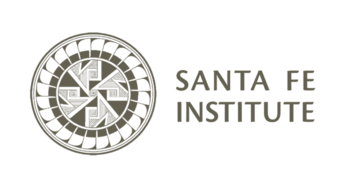
2020 UNDERGRADUATE COMPLEXITY RESEARCH
June 7 - August 15, 2020
Program Overview
The Santa Fe Institute (SFI) Undergraduate Complexity Research (UCR) program focuses on computational and mathematical modeling of complex systems, often paired with the analysis and collection of diverse domain-specific data. The program aims to empower the next generation of mathematically and computationally sophisticated researchers.
SFI research involves a mixture of computational simulations, mathematical modeling, and the analysis of data. Applications are in fields as diverse as ecology and economics but with the unifying theme of complexity science. Drawing on SFI’s research strengths, the UCR program offers a guided introduction to the analytic and computational tools to interrogate complex systems, and experience in applying those tools to a novel research question under the guidance of SFI mentor(s).
In particular, UCR participants will gain experience:
• Designing a mathematical model of a physical, biological, or social system
• Identifying opportunities to solve this model exactly or approximately
• Coding and running simulations of the model
• Recognizing assumptions behind a given mathematical technique
• Assessing applicability of a given modeling approach to the system of interest
• Designing computational experiments with an understanding of uncertainty and noise
• Comparing results to theoretical predictions and real-world datasets
• Exploring a model’s parameter space
• Formulating new hypotheses based on the results of the simulations
• Synthesizing results of models or simulations to support or refute hypotheses
UCR participants are in residence in Santa Fe for approximately 10 weeks, from June to August, 2020. The majority of this time will be spent working on a independent research project under the guidance of SFI mentors. Prior to arriving at SFI, participants are asked to complete SFI's online course “Introduction to Complexity.” Throughout the summer, participants will attend skills tutorials, topical lectures, research seminars, group discussions and professional development workshops.
The REU program at SFI is one of the weirdest places that you can spend your summer, and it is the type of opportunity that can be offered no where else on this Earth. You will be stretched intellectually and welcomed into the SFI family with open arms. Your fellow REUs will help show you new ways of thinking and together you will create a summer that will be some of the best months of you life. -- 2018 REU
Support & Transportation:
Housing and a meal plan will be provided, at no cost to the student, in double-occupancy rooms with shared bathrooms at a nearby college in Santa Fe. Modest living stipends will also be provided to participants during their stay, along with some support of round-trip travel expenses from the home institution. Because Santa Fe lacks a full public transportation system, we encourage those participants who can bring their private transportation to do so.
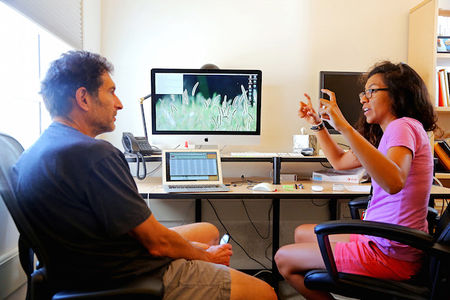
Eligibility: For the purposes of this program, an undergraduate student is one who is enrolled in a degree program (part-time or full-time) leading to a bachelor's degree. Students transferring from one institution to another who are enrolled at neither institution during the intervening summer may participate. College seniors graduating in Spring 2018 are not eligible. High school graduates who have been accepted at an undergraduate institution but who have not yet started their undergraduate study are also eligible to participate. Strong mathematical skills and experience with a programming language are favorably considered. Students from all backgrounds in the physical, natural, and social sciences are invited to participate. Applicants are welcome from any country. International students will need to be sponsored on an F-1 visa by their home institution (contact your international office at your university to inquire about CPT/OPT status). Women and minority students are encouraged to apply.
For further information about the program, please e-mail education@santafe.edu, or call (505) 946-2726.
The Santa Fe Institute UCR Program is supported by the National Science Foundation under Grant Number ACI-1358567, Arizona State University, and the Santa Fe Institute.
Any opinions, findings, and conclusions or recommendations expressed in this material are those of the author(s) and do not necessarily reflect the views of the National Science Foundation or Arizona State University


